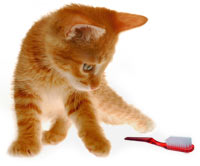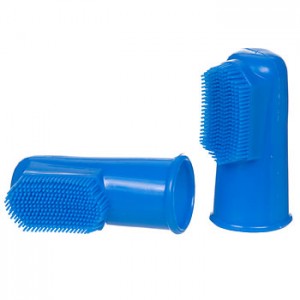Did you know that February is National Pet Dental Health Month? Did you even know that you should be concerned with your pet’s dental health?
Animals can’t operate tooth brushes, so it’s easy to assume that they don’t need to brush their teeth. But you can brush their teeth for them, and it’s actually highly recommended. Just as gum disease is common in people and causes a variety of systemic health problems — diabetes, heart disease, stroke — your pet can develop gum disease as well. Many people complain that their dog or cat suffers from bad breath, but few realize that this can signal periodontal disease.
There are pet toothpastes and toothbrushes available at your local pet store. The American Veterinary Medical Association recommends daily brushing, but even every other day or a few times a week can greatly reduce your pet’s chances of developing gum disease. Never use toothpaste designed for people on your pet. That would cause them to get a tummy ache.
 Here are some tips for brushing your pet’s teeth:
Here are some tips for brushing your pet’s teeth:
- Let your pet taste the toothpaste from the tip of your finger first. The paste should be designed to taste good to your pet, leaving him or her wanting more.
- Once your pet has tasted the toothpaste, put a little on the toothbrush. There are two different types of pet toothbrushes available. One looks like a traditional human tooth brush, while the other is a finger-shaped rubber cuff with bristles that fits over the tip of your finger. This second type of pet toothbrush can be easier to use — you simply stick your finger in your pet’s mouth!
- Gently massage the teeth, paying special attention to the gum line. If you can’t get all of your pet’s teeth the first few tries, don’t fret. They’ll get used to it eventually, letting you finish the job as they become more comfortable.
Pet toothpaste is completely edible, so there’s no need to rinse after brushing.
Your pet’s vet can also perform dental exams and provide you with guidance on preventing gum disease for your pet. With a little attention and tender loving care, your pet can live a long, healthy life. The best part? No more bad breath!
Comments are closed.